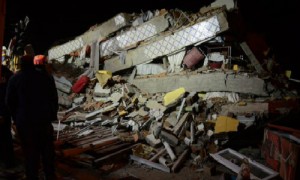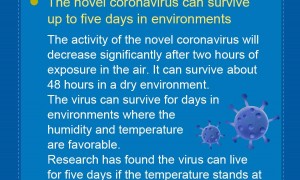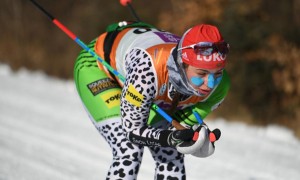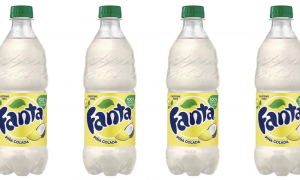导读:由于“伊斯兰国”在撤离时点燃了盖亚拉的油井,该地区居民生活已经被石油燃烧产生的黑烟严重污染,威胁甚至不亚于极端分子占据该镇时期。
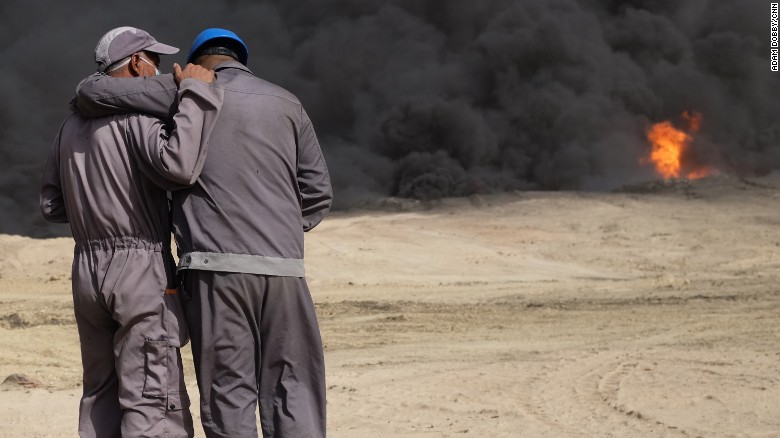
Al-Qayyara, Iraq (CNN)"We cover the children at night when they sleep," said Khalil. His hands were stained black, the air in the entrance to his house thick with smoke.
CNN伊拉克盖亚拉报道——“晚上孩子们睡觉的时候,我们必须把他们从头到脚都遮起来。”卡里尔说。他的手黑黑的,进到他家里的空气也伴随着厚厚的烟。
Khalil, his wife and five children live but a minute’s walk from a blazing oil well, one of more than a dozen ISIS has set alight in recent months.
卡里尔、他的妻子以及五个孩子的住处,离燃烧的油井只有步行一分钟的路程。这只是几个月来“伊斯兰国”点燃的油井之一。
His two-year-old son Obaida watched us warily. His bare feet were black, his face grimy with soot.
他两岁的儿子奥贝达警惕地看着我们。他没穿鞋,露出了黑黑的小脚。他的脸上很脏,都是黑灰。
"We close all the windows and the doors to keep the smoke out," Khalil said, shrugging, adding "that’s all we can do."
“我们把所有的门窗都关上,挡住烟尘。”卡里尔耸耸肩,补充说,“我们能做的也只有这些了。”
Khalil insisted his children are fine, but their gray pallor suggested otherwise.
卡里尔坚持说他的孩子们没事,但是他们苍白的小脸可不像是没事。
ISIS has been pushed out, but it left behind burning oil wells.
“伊斯兰国”已经被赶走了,但是却留下了燃烧的油井。
As we spoke, Khalil offered us water. "No thank you," I said, my throat parched with thirst and rough from the smoke. "I drank in the car." He offered tea, which I also declined. Everything in the house, the walls, the floor, the furniture, was stained by soot. The whole place felt toxic. As much as possible I tried to breathe through my nose.
我们说话的时候,卡里尔给我们拿来了水。“不用了,谢谢。”我的嗓子已经被烟熏得又干又渴,“我在车里喝过水了。”他又拿来了茶,我还是拒绝了。他家中所有东西——墙壁、地板和家具,每一寸都覆盖着黑灰。整个地方看起来像有毒一样。我尽可能试着用鼻子呼吸。
Khalil, an oil field guard, moved back with his family to their home in Al-Qayyara a week before.
卡里尔是一名油田警卫员,一周前他们全家搬回了盖亚拉镇。
ISIS militants had set the wells on fire hoping to obscure the view of Iraqi and coalition warplanes, but it didn’t stop Iraqi forces from driving them out of town in late August. Technicians from the provincial oil company were able to put some of the fires out, but not the one near Khalil’s house. Every time they tried, ISIS fighters lobbed mortar rounds their way.
“伊斯兰国”武装分子点燃油井是为了模糊伊拉克及联军战机的视野,但是最终他们还是在8月末被伊拉克军队赶出了该镇。省立石油公司的技术人员已经扑灭了几处火灾,但卡里尔家附近油井的火还没有被扑灭——每次他们想去灭火,“伊斯兰国”就会用迫击炮挡住他们的路。
Thirty-year oil industry veteran engineer Hussain Salim has the formidable task of putting out the fires, and explained to me in great technical detail how it’s done. It only takes a quick glance at the black smoke on the horizon to understand the scale of the work at hand. "It took 30 days, a month, to put out one fire," he said.
有着30年石油从业经验的工程师侯赛因·萨利姆要打一场扑灭油井火灾的硬仗,并解释了扑灭火灾的大量技术细节。仅仅看一眼从地平线腾空而起的黑烟,就足以想见他们手头工作的艰辛。“扑灭一处油井火灾通常需要花上30天的时间,足足一个月啊。”他说。
They’ve managed to put out six fires so far, but they have nine to go. The engineers estimate 5,000 barrels of oil are burning here every day. Earlier this week ISIS militants sabotaged another well.
目前他们已经扑灭了6处油井的火,但是还有9处没有扑灭。据工程师估计,火灾每天会烧掉近5000桶石油。本周早些时候,“伊斯兰国”武装分子又破坏了一处油井。
Outside the mayor’s office, more than a dozen men wait for security clearances to allow them to travel outside Al-Qayyara. many stayed in town during ISIS rule, and as a result require security clearance to leave. Their main complaint was not the bureaucracy, but rather the smoke from the oil fires.
镇长办公室外,十几个人等着进行安全调查和办理出镇手续——由于在“伊斯兰国”占领期间很多人都待在镇里,所以现在出去需要由镇长进行安全调查。他们主要抱怨的倒不是低效率的官僚主义,而是油井的黑烟。
"It’s like poison," one man said. "You feel sick all the time, it gets in your nose, your lungs, on your skin, everywhere."
“就像是毒药一样,”其中一个人说,“你每时每刻都觉得难受,它飘进你的鼻子,落在你的皮肤上,到处都是。”
Away from the men, a woman with two children was waiting for her husband. "The children are constantly coughing," she said, "and we don’t have any soap to wash them."
几步之外,一个女人带着两个孩子在等她的丈夫。“孩子们一直在咳嗽,”她说,“而且我们没有香皂之类的东西给他们洗洗干净。”
Inside, Mayor Salih Al-Jabouri was busy signing travel passes. He, too, worries about the long-term effects of the smoke, and the lack of medical facilities to treat people. The town’s four-storey hospital, now padlocked, stands next to the burning well near Khalil’s house. A makeshift clinic is open for a few hours in the morning.
在办公室里,镇长萨利赫·贾博里正忙着办理出镇手续。他也很担心浓烟带来的长期影响,以及该镇缺医少药的现状。镇上唯一一家四层楼高的医院就在燃烧的油井旁边,离卡里尔家不远,目前无法开业。只有一个临时诊所,每天上午能开几个小时。
"The fires are causing mental and breathing problems," he told me, "especially to those who have asthma and allergies. Those who aren’t sick now," he warned, "will become sick."
“大火引发了精神和呼吸问题。”他说。“特别是那些有哮喘和过敏症的人,那些现在没有病的人,”他警告说,“可能以后也会生病。”
Despite all this, life is returning to Al-Qayyara. Vegetable stalls are up and running, as well as stores for mobile phones, a gadget banned under ISIS rule. But also here, the topic of conversation quickly turns to the pall of black smoke hovering over town.
除了这些以外,盖亚拉镇的生活倒是慢慢恢复了以前的样子。街上又有了蔬菜摊,手机店也重新开业了——在“伊斯兰国”统治下,手机是被禁止使用的。但是在这里,人们聊天的话题总是会迅速转向盘旋在小镇上空的浓烟。
"It’s a second Daesh," said vegetable vender Shaalan, using an Arabic term for ISIS. "It’s cancer."
“这是又一个‘伊斯兰国’,”蔬菜小贩沙兰用另一个阿拉伯语词来形容它,“那就是癌症。”



